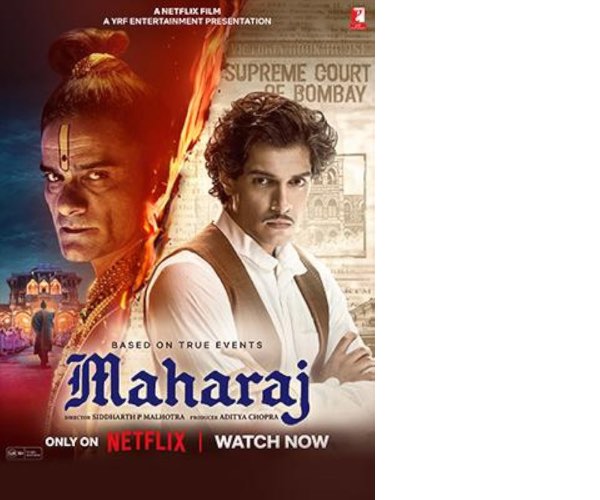
Aug 06 2024.
views 258Struggling to navigate the everexpanding world of streaming services and on-demand content? Feeling lost in a sea of options, unsure of what to watch next? Worry no more, because The Watchlist Whisperer is here to guide you! We’ll be your trusted source for must-watch picks, from captivating dramas and laugh-out-loud comedies to thrilling documentaries and thought-provoking films. Consider us your personal concierge for all things screen-worthy. So, grab your remote, settle in, and get ready to discover your next obsession with The Watchlist Whisperer!
This week, we’re diving into a cinematic royal rumble. Two films, one similar title, and worlds apart in storytelling. From the opulent grandeur of historical drama to the gritty underbelly of modern-day revenge, these films promise to be as different as chalk and cheese. Let’s see which one truly deserves the royal treatment - Maharaj or Maharaja?
Maharaja (Netflix)

I’m not one to jump on the bandwagon when it comes to hyped-up movies. But “Maharaja” was an exception. Word-ofmouth buzz from friends had me intrigued. Their insistence on its brilliance piqued my curiosity, and I found myself eagerly anticipating its release.
Vijay Sethupathi - its protagonist - is a beast. No, seriously. The man is an absolute powerhouse. In Maharaja, he’s unleashed his inner monster, and the result is a cinematic hurricane. This isn’t just a movie; it’s a full-on assault on your senses. Sethupathi’s transformation into the titular Maharaja is mind-boggling. He’s terrifying, yet strangely compelling. The guy has a screen presence that could power a small city. The supporting cast, adds depth and complexity to this already explosive narrative.
Maharaja is a gripping Tamil- language thriller that delves into the depths of a man’s despair and his relentless pursuit of justice. Sethupathi delivers a tour-deforce performance as a seemingly ordinary barber whose life is irrevocably shattered by a tragic incident involving his family. The first half is a masterful build-up, with each scene adding layers to the mystery.
From the outset, Maharaja is a perplexing enigma. The non-linear narrative, while initially disorienting, soon reveals itself as a deliberate choice. It’s like piecing together a puzzle, each scene contributing to the larger picture. Sethupathi’s performance as the enigmatic protagonist is a standout, his understated intensity captivating the screen. The film unfolds as a heart-wrenching tale of loss, grief, and the lengths a father will go to protect his loved ones.
When a devastating crime upends his world, the protagonist is forced to confront a darkness within himself. His quest for retribution becomes a complex and dangerous journey, f illed with unexpected twists and turns. However, as the film progresses, it begins to lose its grip. The narrative, while initially intriguing, starts to unravel, revealing a story that’s perhaps less complex than it initially seemed. The film’s potential for a thought-provoking exploration of societal issues is squandered in favour of a more conventional thriller.
Beyond the thrilling action sequences, Maharaja is a poignant exploration of human resilience and the blurred lines between victim and avenger. The film masterfully balances intense moments of violence with quieter, more introspective scenes, offering a multifaceted portrayal of its central character.
Maharaj (Netflix)

Maharaj is a swing and a miss. The concept is a home run: 1860s Bombay, a journalist, and a godman locked in a battle for the ages. It’s a clash of titans that should have had us on the edge of our seats. But this f ilm is more of a gentle lob than a power hitter.
Maharaj transports us to the tumultuous Bombay of the 1860s, a cauldron of social unrest simmering beneath a veneer of religious piety. At its core, the film promises a thrilling David and Goliath showdown between the intrepid journalist Karsandas Mulji and the omnipotent godman. A clash of intellect versus superstition, truth versus power - it’s a narrative with the potential to electrify. Yet, despite the promising premise, Maharaj falters in capturing the full force of this historical collision.
The film grapples with the complexities of an era marked by profound social change, but it often feels more invested in dramatic spectacle than in offering a nuanced exploration of the issues at play. The historical backdrop, while visually striking, is treated more as a stage set than a living, breathing entity. It’s a missed opportunity to delve deep into the intricacies of Bombay life, to capture the zeitgeist of a society on the cusp of transformation. Junaid Khan’s portrayal of Karsandas Mulji is commendable, a beacon of courage in a world shrouded in fear.
However, the film as a whole lacks the depth and richness it could have achieved. Characters are sketched rather than fully realised, leaving us yearning for a more intimate understanding of their motivations and complexities. Ultimately, Maharaj is a superficial exploration of a pivotal moment in history. While it may entertain with its dramatic flair, it fails to ignite a spark, to challenge our thinking, or to leave a lasting impression.
In a world saturated with historical dramas, Maharaj is a missed opportunity to create a truly unforgettable cinematic experience. Maharaj presents a fascinating premise with a backdrop that still resonates today. The manipulation of religion for personal gain is a theme that unfortunately remains relevant across many cultures. While the film’s execution falls short of its potential, it does spark intriguing conversations about faith, power, and societal pressures. Despite its shortcomings, Maharaj is still an interesting watch that offers a glimpse into a complex era.
0 Comments